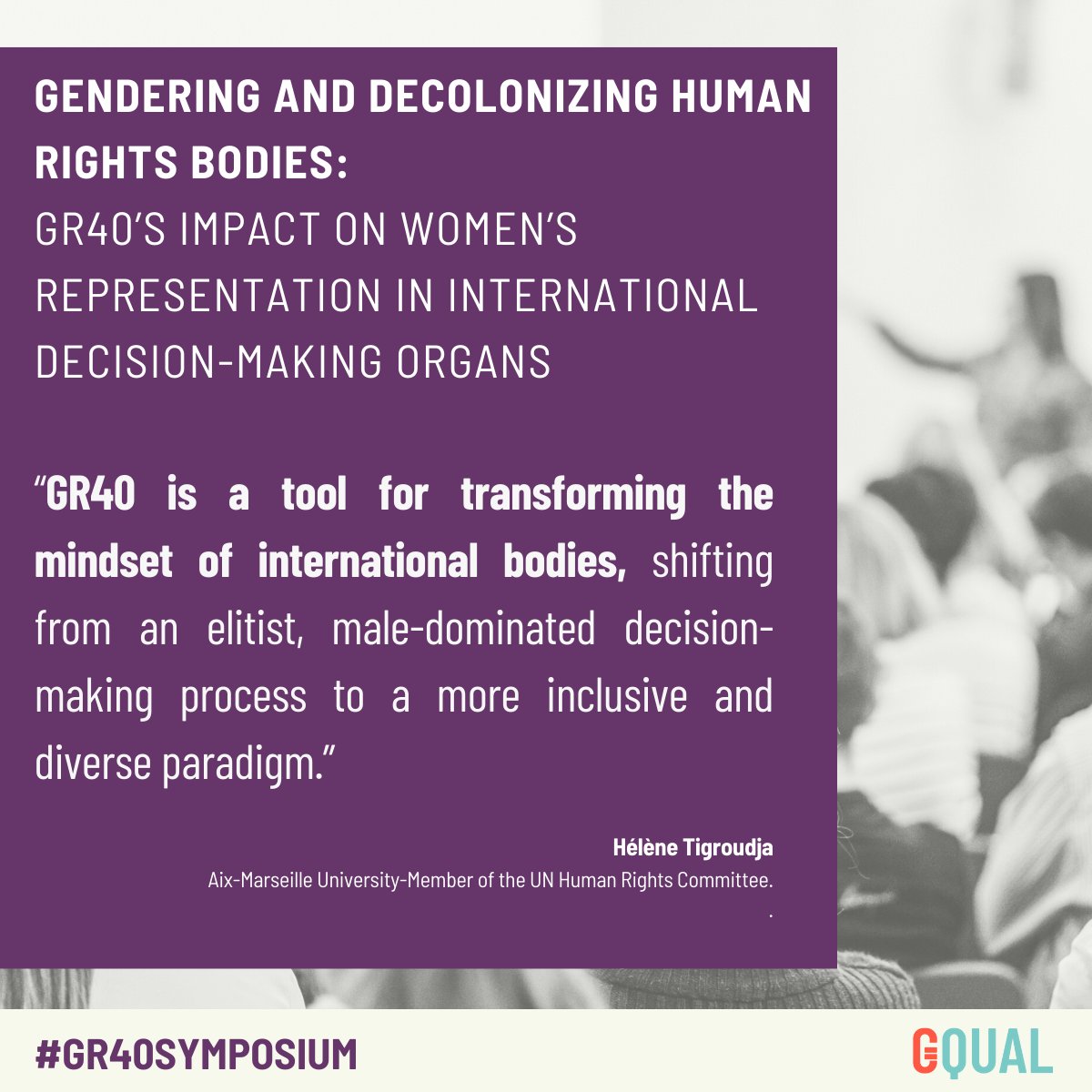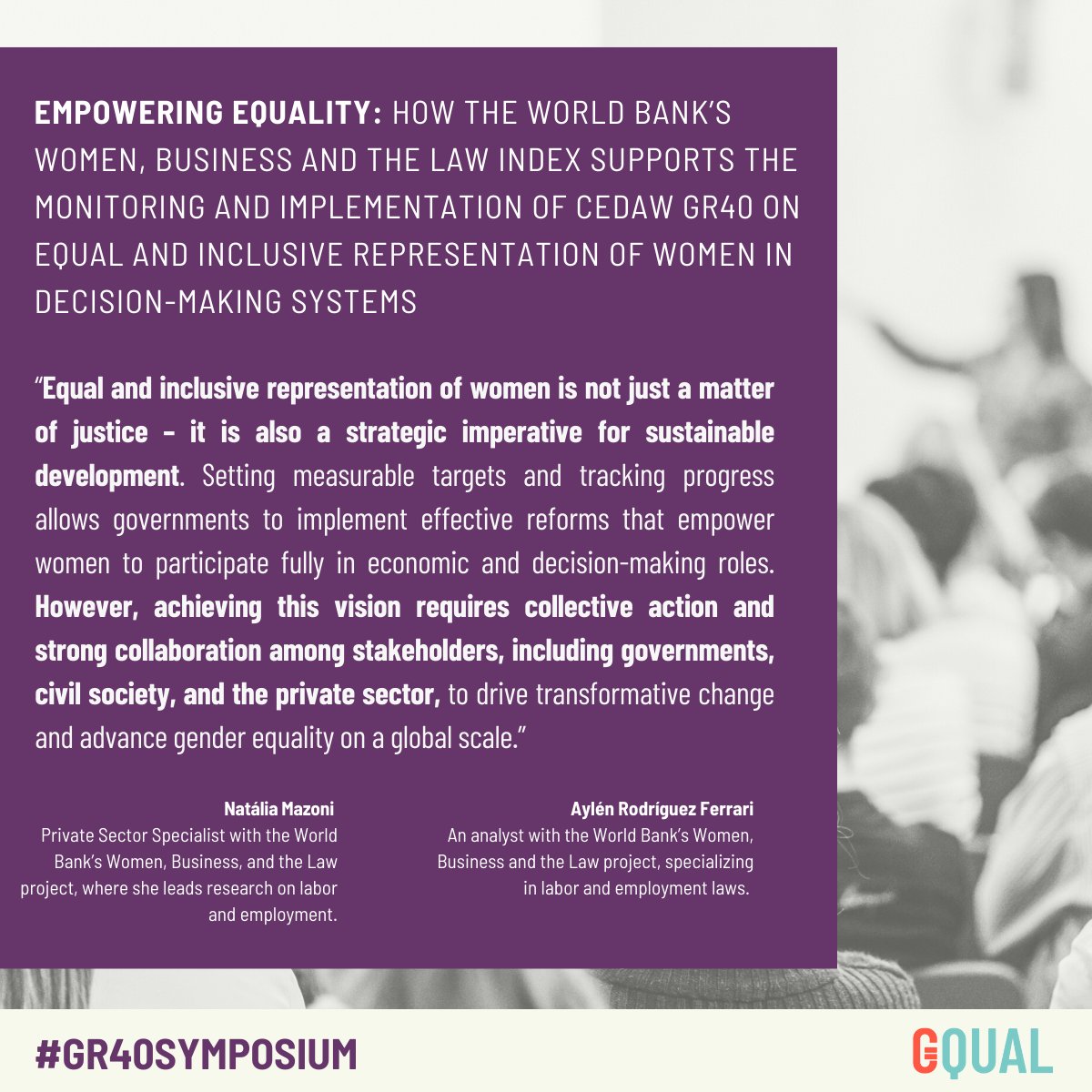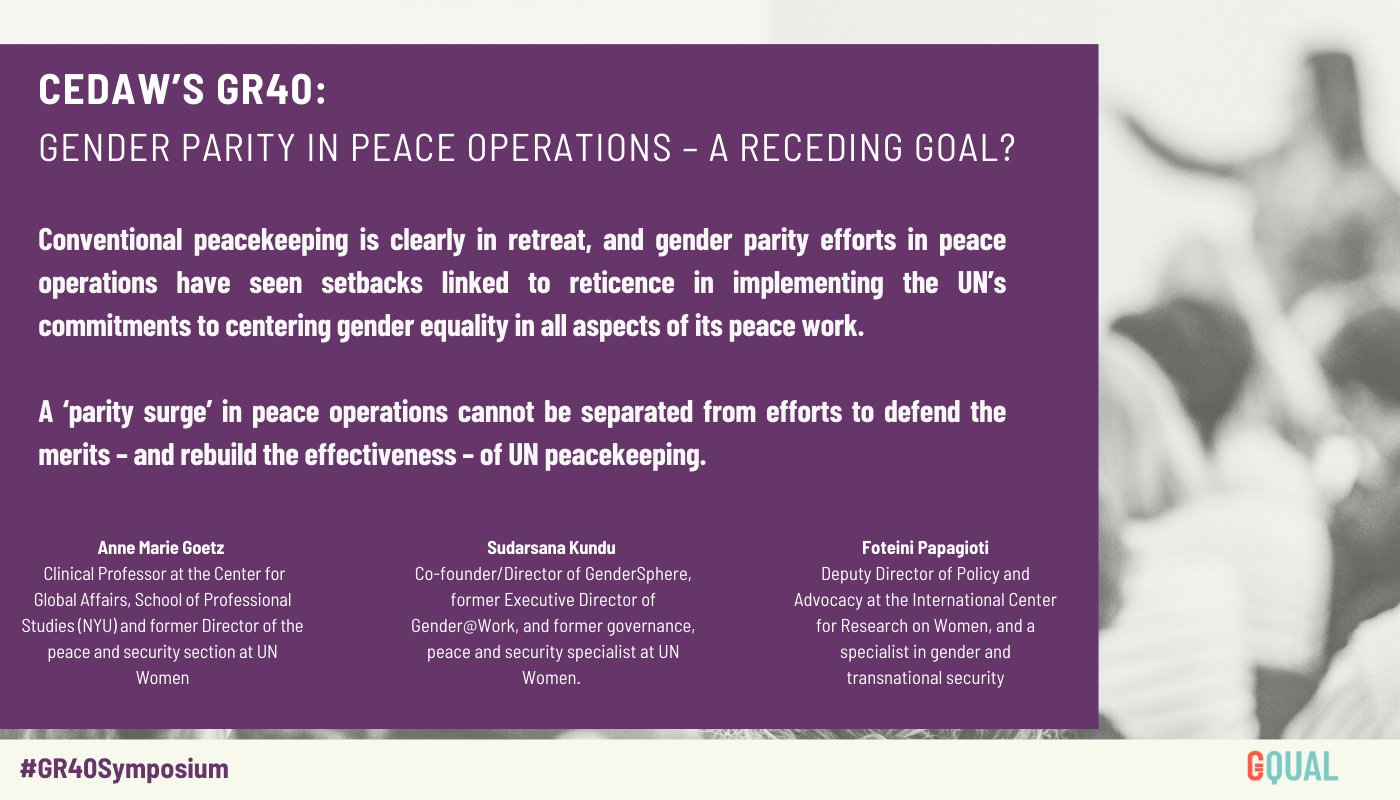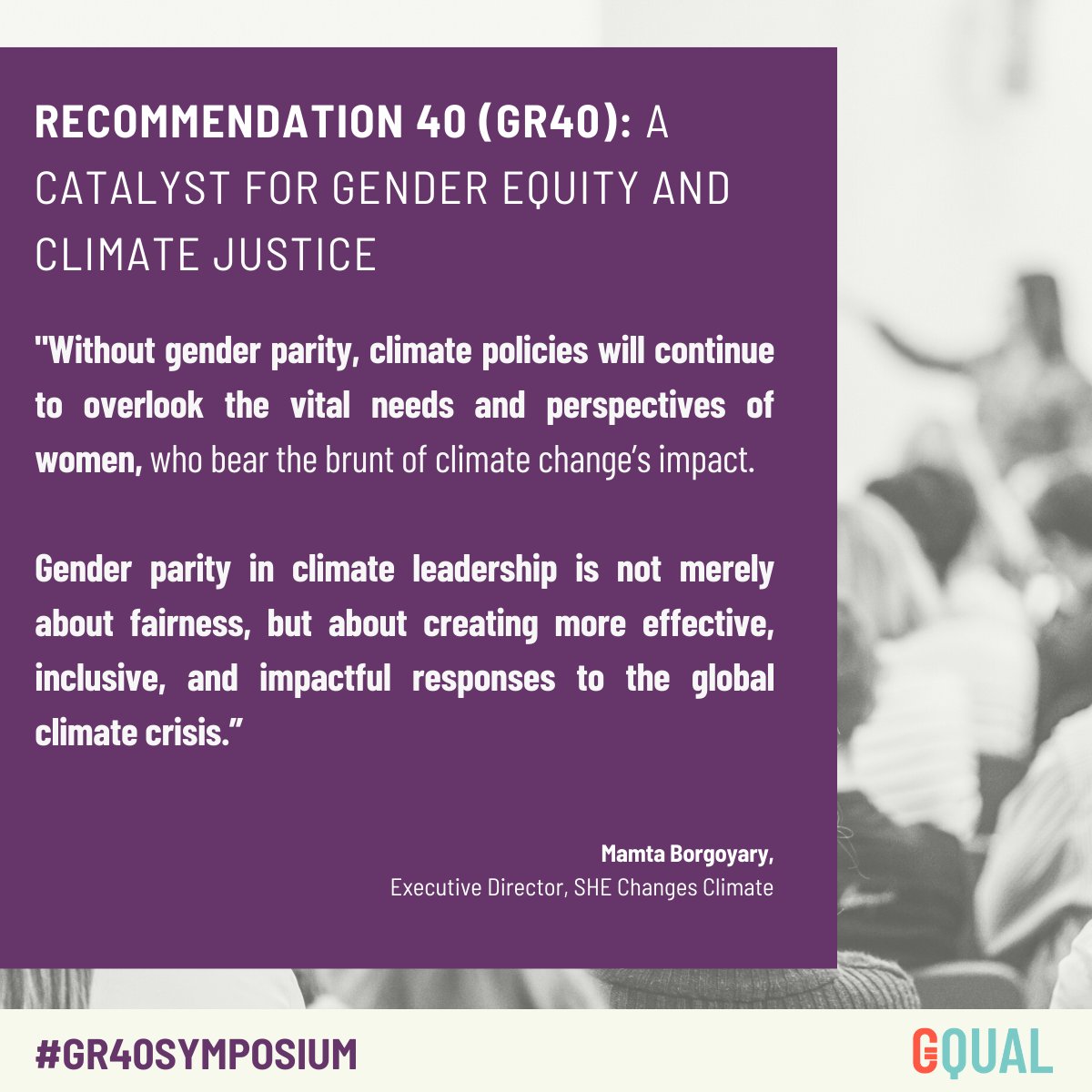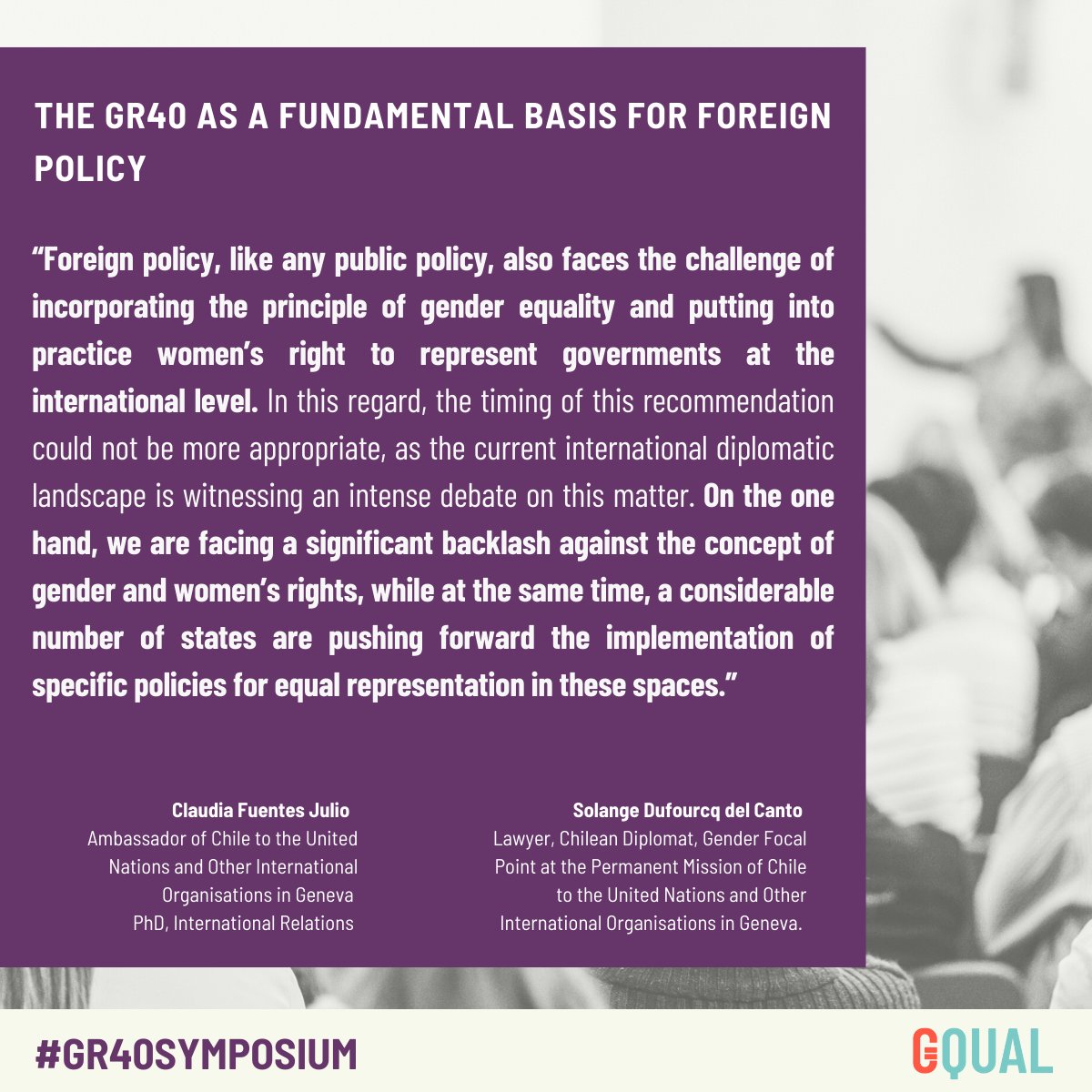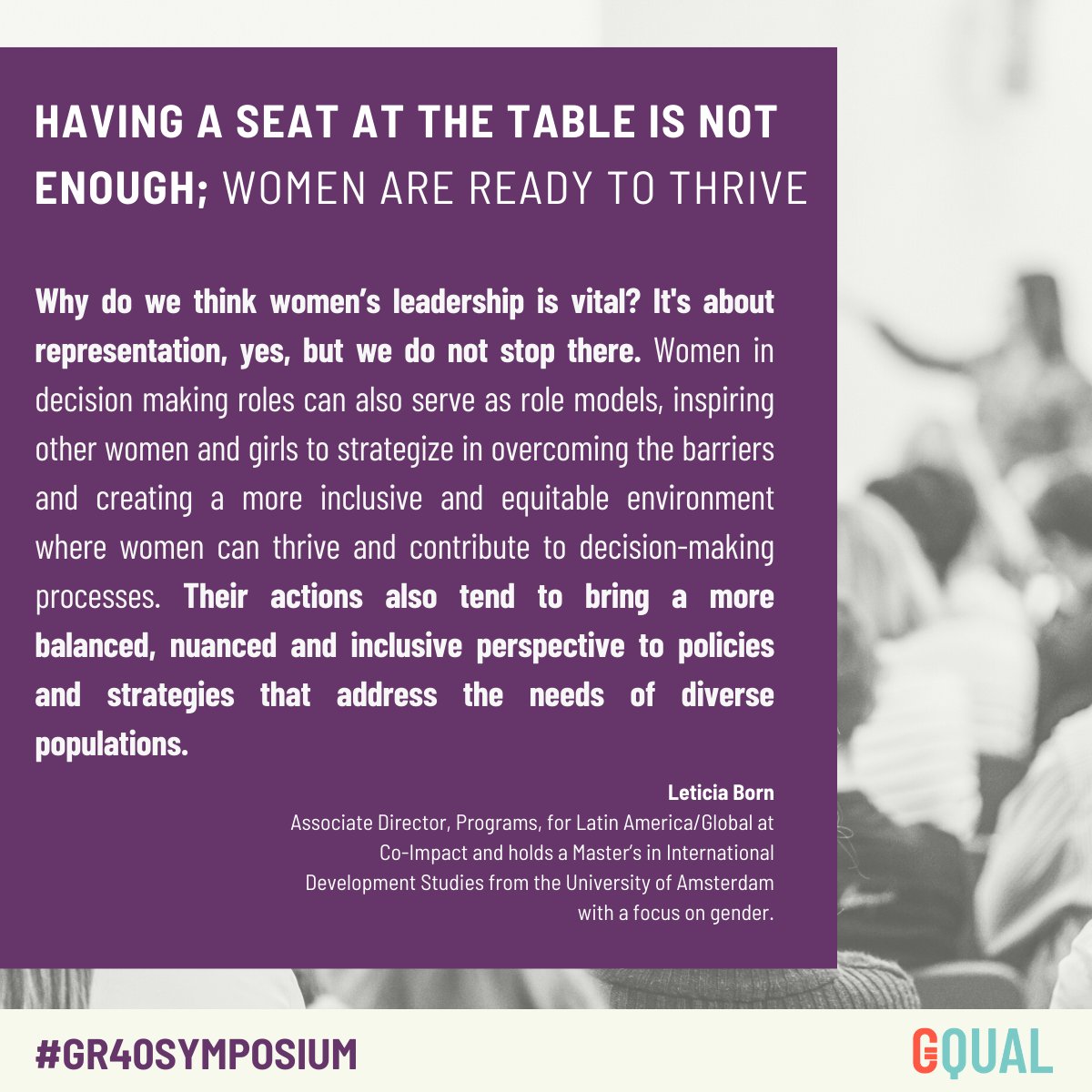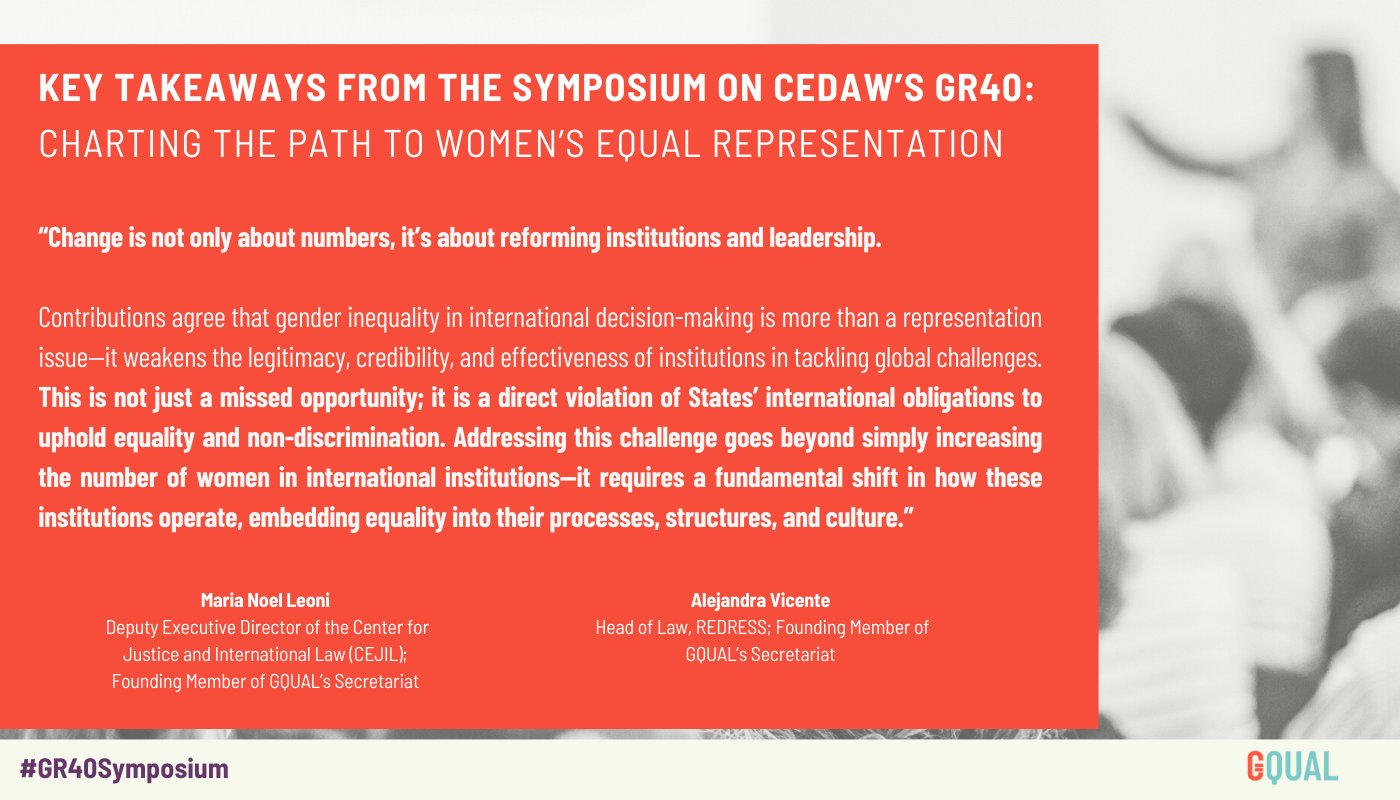Closing the #GR40Symposium: Advancing Women’s Equal Representation in Global Decision-Making
From February 3rd to 7th, the GQUAL Campaign, in collaboration with Opinio Juris, hosted the symposium “Transforming Decision-Making: The Power of CEDAW’s GR40 in Advancing Women’s Equal Representation.” This online event offered a crucial opportunity to reflect on the importance of CEDAW’s General Recommendation 40 (GR40) and its potential to transform global decision-making systems to ensure equal and inclusive participation of women.
Through 17 contributions, 23 experts explored the persistent barriers women face in critical international fields—international justice, climate negotiations, peace and security, arbitration, trade, and multilateralism—across diverse regions and career stages. Their insights not only highlight these challenges but also examine them through the lens of international legal obligations under GR40, emphasizing the concrete opportunities it creates for transformative change. This collective analysis reaffirms that advancing gender equality in international decision-making is not just a matter of fairness but a fundamental imperative for more legitimate, effective, and representative global governance.
The Need for Structural Change in Global Decision-Making
Women’s representation in key international decision-making roles remains significantly below parity. This underrepresentation is not a coincidence but a deeply ingrained structural issue within international governance frameworks. As discussed in the opening blog post of the symposium, the gender imbalance across critical areas such as international courts, diplomacy, and political leadership reflects long standing barriers that continue to limit women’s access to decision-making power. These structural gaps must be addressed to improve the legitimacy and effectiveness of global institutions, and to protect women’s right to equality.
Nicole Ameline, former Member of CEDAW and Chair of the GR40 Working Group, emphasized that the absence of women in leadership roles directly affects how global challenges are tackled. She pointed out that “in a world facing existential challenges—conflicts, crises, migration, climate change, and poverty—the stagnation of women’s representation in decision-making is both unacceptable and unsuited to these global challenges.” Without gender parity, the policies formulated by international bodies are limited, failing to reflect the diverse needs of the global community. This underrepresentation is more than just a statistical issue—it is a barrier to addressing global challenges effectively.
The Power of GR40 in Shaping Inclusive Governance
Adopted in October 2024 by the CEDAW Committee, GR40 marks a significant step forward in institutionalizing gender parity as a universal non-negotiable standard in decision-making at all levels. It is not merely about increasing women’s presence in leadership roles but about ensuring they have equal power to lead and influence outcomes. This bold framework establishes parity as a permanent legal principle, an essential foundation for effective governance.
GR40’s transformative value lies in its ability to move gender parity from an aspiration to a binding legal obligation. By embedding parity as a non-negotiable principle, GR40 guarantees that gender parity becomes a core feature of all decision-making processes globally. The symposium underscored the importance of shifting from merely symbolic representation to empowering women to make a real impact on decisions.
The Global Challenges and the Need for Parity
The global challenges we face—from climate change and economic inequality to geopolitical instability and human rights abuses—demand leadership that reflects diverse experiences and perspectives. Gender parity in leadership is crucial for developing sustainable solutions to these pressing global issues. Exclusionary leadership structures will continue to hinder global progress, particularly in areas where women’s leadership is essential to finding lasting solutions.
Moving Beyond Symbolic Representation
A central takeaway from the symposium was the need to move beyond symbolic representation. It is not enough to increase the number of women in leadership roles; women must have the authority to influence and shape decisions.GR40’s call for gender parity goes beyond simply raising the number of women—it is about ensuring that women hold meaningful power to shape the global agenda.
Achieving true parity requires a shift in how leadership is structured at every level. Women must be empowered not just to sit at the table but to lead discussions, influence decisions, and drive change. This is the essence of true gender parity.
The Path Forward: Full Implementation of GR40
While the symposium was an important step in advancing the conversation, the real work begins now. GR40 provides the necessary legal framework, but its full impact will only be realized when it is implemented across all international institutions. Achieving this requires sustained political will, transparency, and active engagement from governments, civil society, and international bodies.
At the GQUAL Campaign, we remain committed to advocating for the full adoption of GR40. We will continue to work with global leaders and organizations to ensure that gender parity is not just a principle but a lived practice that shapes global governance.
Expert Contributions: A Vision for Change
We are deeply grateful to the experts who contributed to the symposium, sharing their insights on how GR40 can drive meaningful and lasting change. Their perspectives are invaluable in shaping our ongoing efforts toward gender parity in global decision-making.
You can access their contributions here:
-
Alejandra Vicente & Maria Noel Leoni – Opening blog
Read the blog post here
-
Nicole Ameline – CEDAW GR 40: Roadmap to Parity 50/50
Read the blog post here
-
Claudia Martin – Reinvigorating Equal and Inclusive Participation of Women in International Decision-Making
Read the blog post here
-
Hélène Tigroudja – Gendering and Decolonizing Human Rights Bodies
Read the blog post here
-
Dr. Nilüfer Oral & Rashmi Raman – Gender Parity in the ICJ and ILC – About Time!
Read the blog post here
-
Laura Nyirinkindi – Gender Parity, Power, and Influence: The Path Less Taken
Read the blog post here
-
Natália Mazoni & Aylén Rodríguez Ferrari – Empowering Equality: How the World Bank’s Women, Business and the Law Index Supports the Monitoring and Implementation of CEDAW GR40 on Equal and Inclusive Representation of Women in Decision-Making Systems
Read the blog post here
-
Natalie Samarasinghe – Appointing Madame Secretary-General — A Legal Obligation?
Read the blog post here
-
Anne Marie Goetz, Sudarsana Kundu & Foteini Papagioti – Gender and Transnational Security
Read the blog post here
-
Mamta Borgoyary – Recommendation 40 (GR40): A Catalyst for Gender Equity and Climate Justice
Read the blog post here
-
Anoush Der Boghossian – Let’s Close the Gender Leadership Gap in Global Trade
Read the blog post here
-
Mairée Uran Bidegain – CEDAW’s General Recommendation 40: A Catalyst for Gender Equality in International Investment Arbitration
Read the blog post here
-
Alejandra Mora & Marta Martínez – CEDAW General Recommendation No. 40 in the Inter-American System: Perspectives from the Inter-American Commission of Women of the OAS
Read the blog post here
-
Priya Pillai – An Opportunity for Asia-Pacific: Build on the Momentum of GR40
Read the blog post here
-
Leticia Born – Having a Seat at the Table Is Not Enough; Women Are Ready to Thrive
Read the blog post here
-
Claudia Fuentes Julio, Solange Dufourcq del Canto – The GR4O as a fundamental basis for foreign policy
Read the blog post here
-
Maria Noel Leoni, Alejandra Vicente – Key Takeaways from the Symposium on CEDAW’s GR40: Charting the Path to Women’s Equal Representation
Read the blog post here



